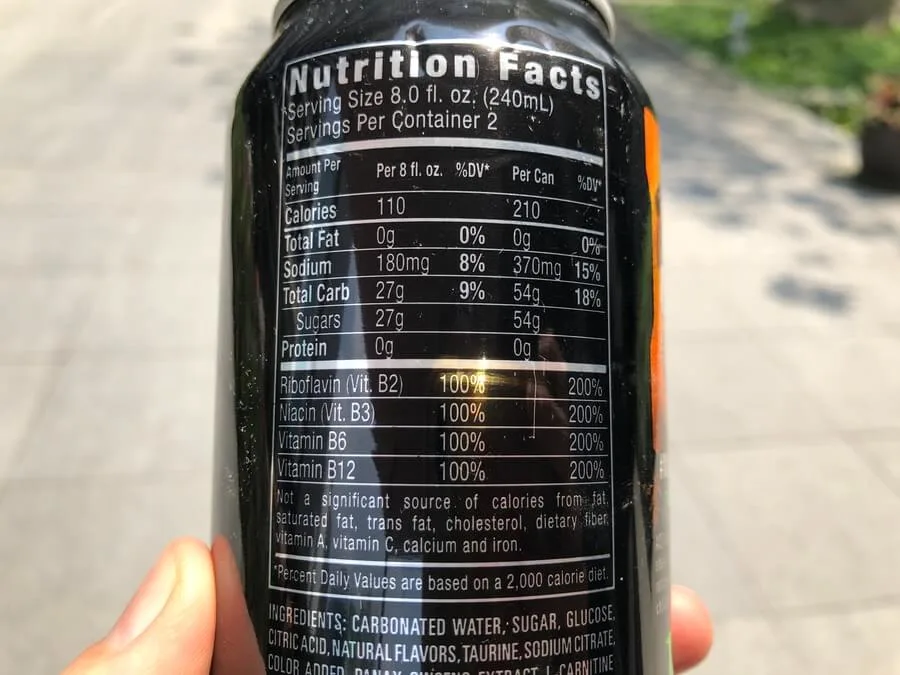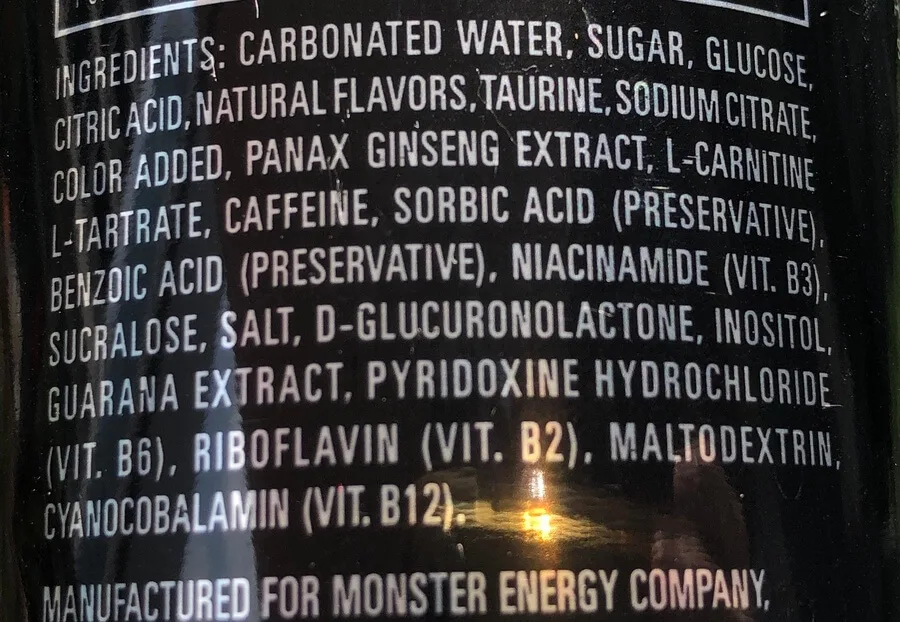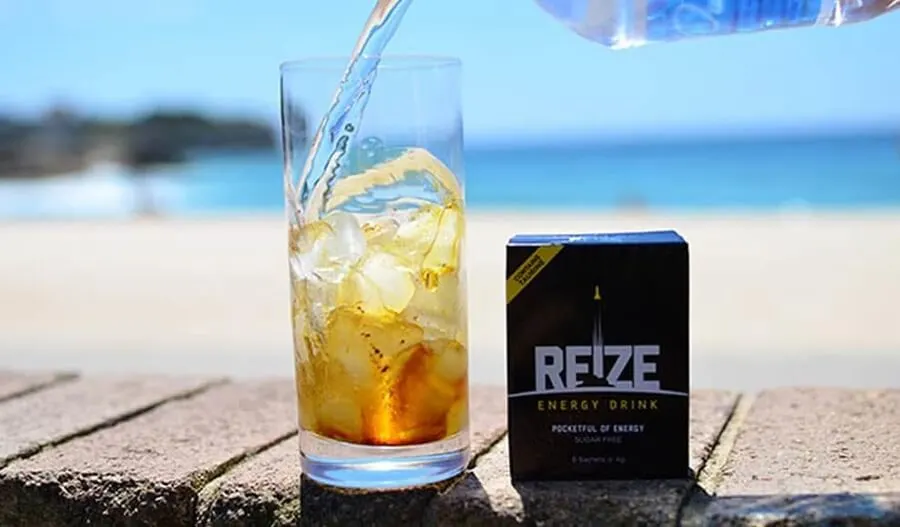There’s no denying that Monster Energy is one of the famous energy drinks out there. One can easily recognize it by its green-claw logo running down the side of a black can.
While you may know what’s in a can of Monster from the previous article I’ve written on Monster’s caffeine and ingredients, now you might be wondering: does it actually give you energy?
Monster’s 160mg of caffeine is enough for a solid energy boost. In addition, it also contains 210 calories and 54g of sugar to further energize you. However, the caloric and sugar content may be too high already so make sure you stick to one can a day only.
For a more detailed analysis, read on to find out all there is to know about Monster Energy – from its ingredients to its overall nutritional value.
Monster Energy Nutrition Facts
Have a look at the nutrition facts of Monster Energy, as shown in the table below:
| Typical Values (Per 12 fl.oz) | Monster Energy |
| Energy | 210 Calories |
| Fat (Of which Saturated) | 0g (0g) |
| Carbohydrate (Of which Sugars) | 54g (54g) |
| Caffeine | 160mg |
| Protein | 0g |
| Sodium | 370mg |
| Vitamin B2 (Riboflavin) | 3.6mg |
| Vitamin B3 (Niacin) | 46mg |
| Vitamin B6 | 4.6mg |
| Vitamin B12 | 13µg |

Monster Energy Calorie Content
Monster Energy comes with 210 calories per 16 fl.oz serving, which is quite the amount.
You might want to try out low-calorie energy drinks if you’re looking for a healthier option, as Monster Energy contains a whopping 210 calories.
It’s important to note that the recommended daily caloric intake ranges between 2000 to 2500 calories for an average adult.
Regardless, whether you’re an active person and have a high metabolism, drinking a can of Monster still takes up more than 1/10th of your daily required caloric intake.
The sugar-free Monster Ultra series is available in a wide range of tastes for those who desire the energy boost of Monster Energy without the associated calorie count.
And if you wish to explore more options of low-calorie energy drinks, have a look at the article I’ve written on the best zero-calorie energy drinks. You might find an energy drink that suits you better.
Monster Energy Ingredients
Next up, let’s have a look at all the ingredients that go in a Monster Energy Drink:
- Carbonated Water
- Sugar
- Glucose
- Citric Acid
- Natural Flavours
- Taurine
- Sodium Citrate
- Color Added
- Panax Ginseng Extract
- L-Carnitine L-Tartrate
- Caffeine
- Sorbic Acid
- Benzoic Acid
- Niacinamide (Vitamin B3)
- Sucralose
- Salt
- D-Glucuronolactone
- Inositol
- Guarana Extract
- Pyridoxine Hydrochloride (Vitamin B6)
- Riboflavin (Vitamin B2)
- Maltodextrin
- Cyanocobalamin (Vitamin B12)

How Much Caffeine Does Monster Energy Have?
A standard 16 fl.oz can of Monster Energy contains 160mg of caffeine, which is a reasonable amount of caffeine for an energy drink that size.
Energy drinks depend on caffeine for their energy-boosting properties, caffeine being one of the best stimulants for keeping you awake as well as improving reaction times and your cognitive function.
While Monster has a lower caffeine content than other energy drinks like Reign or Bang (300mg per 16 fl. oz), 160mg per 16 fl.oz is still a considerable amount, being equivalent to 2 cups of coffee.
That said, how you react to the caffeine mainly depends on your own caffeine metabolism considering that caffeine can give you unpleasant side effects if your body can’t adapt to the amount you consume.
I personally prefer to have energy drinks that contain around 50 to 100mg of caffeine per serving, which is the right amount for a nice boost but not too much that it’ll give me a headache afterward.
While the amount of caffeine in a can of Monster is more than what I often consume, it’s still within a tolerable range for occasional use.
While you can control how much and how fast you have a can of Monster, it’s best not to go over the limit of no more than 400mg of caffeine per day, as approved by the FDA.
Consuming more than the recommended daily caffeine limit may lead to side effects such as:
- Insomnia
- Restlessness
- Headaches
- Stomachaches
- Dizziness
- Dehydration
- Anxiety
My advice is to consume Monster in moderation and try not to double it down with other caffeinated beverages (tea and coffee), especially if you’re new to energy drinks.
How Much Sugar Does Monster Energy Have?
A standard 16 fl.oz can of Monster Energy contains 55g of sugar; thus, it’s considered as one of the most sugary energy drinks out there.
That’s quite an unhealthy amount of sugar in an energy drink, as 55g of sugar is almost equivalent to 3.5 tablespoons of sugar.
To add on, Monster Energy definitely far exceeds the daily added sugar limit of 25g for women and 36g for men, as advised by the AHA.
But of course, it’s totally normal to go satisfy a sweet tooth but consistently over-consuming sugar can lead to health issues such as:
- Acne
- Bad dental health
- Weight gain
- Diabetes
- Addiction
- Increase in heart disease
Besides that, excessive sugar can also leave you with an unwanted sugar crash after, which makes you feel slow and lethargic from the sudden spike and fall in your blood sugar levels.
While it’s completely alright to drink Monster Energy occasionally, I don’t recommend it for your daily caffeine fix due to its high sugar content, which can affect your health in the long run.
If you prefer an energy drink that leans more towards the healthier side, have a quick look at the article I’ve written on the best sugar-free energy drinks, which you’ll hopefully find useful.
Monster Energy B Vitamins
Monster Energy contains a smart combination of B-Vitamins, giving you up to 200% of the daily intake value.
As energy drinks mostly use B-Vitamins to provide nutritional benefits, it’s no wonder they can also be found in Monster Energy.
Check out the table below for the types of B-vitamins Monster Energy contain and what they can offer you:
| Purpose | Amount (Per 16 fl.oz of Monster) | Tolerable Upper Intake Level | |
| Vitamin B3 (Niacin) | Helps the body release energy, keeps skin healthy | 43mg | 35mg |
| Vitamin B2 (Riboflavin) | Cell growth, fat breakdown, energy production | 5.05mg | N/A |
| Vitamin B6 | Store energy from protein and carbohydrates, formation of red blood cells | 5.05mg | 100mg |
| Vitamin B12 | Release energy from food, forms red blood cells, keeps the nervous system healthy | 5.1µg | N/A |
Other Ingredients
Taurine
Taurine is an amino acid that offers plenty of potential benefits and can also be found in other energy drinks like Rockstar and Red Bull.
Now, if you’ve heard of taurine before, you might be familiar with claims of it being derived from a bull’s particular part, but that claim is not true as the taurine in Monster is sourced synthetically from labs.
Although taurine may help improve your cognitive performance, according to this research, that benefit may be more due to caffeine than taurine.
This makes it difficult to determine the exact benefits of taurine, but I think it’s completely alright to have it in your energy drink as it isn’t harmful either.
Panax Ginseng
Panax Ginseng is a natural herb that’s prominent in the Asian culture and it has many health benefits, so it’s not surprising that it’s used in Monster Energy.

The health benefits you may get from ginseng include:
- Increase energy
- Sharper cognitive function
- Anti-inflammatory effects
- Lower blood sugar
Ginseng alone is completely safe for general use and consumption, aside from its rare interactions with certain drugs, but I wouldn’t worry too much about that.
If you would like more information on Panax Ginseng and how it works in your energy drink, I’ve written an article all about ginseng and its benefits, which you’ll definitely find interesting.
L-Carnitine L-Tartrate
L-Carnitine is an amino acid derivative that’s produced in your body and helps transforms fat into energy.
If you lead a healthy lifestyle, you might already have a sufficient amount of L-Carnitine in your body, which means you probably won’t benefit much from its presence in Monster Energy.
Does Monster Energy Give You Energy?
Yes, Monster Energy works well as a quick energy boost, but you shouldn’t be having it too casually due to its sugar and caffeine content.
I think it’s fair to say that Monster Energy is strong stuff. A sugary energy drink like this one can help keep you going through the night when you want to catch up on all those deadlines.
However, Monster Energy won’t do much in the nutrition department as, just like any other energy drink, it’s meant to give you a temporary boost to increase your energy levels.
My advice is, have a proper sleeping schedule rather than depending too much on Monster Energy when you’re tired.
If you’re still interested in giving it a go, the best way to enjoy Monster Energy is to be mindful of your own caffeine tolerance first and only have it occasionally.
Remember, moderation is key.
Does Monster Energy Affect My Health?
While its sugar content can give you a surge of energy, Monster Energy can be detrimental to your health if you’re not mindful of your daily intake.
Here’s a guide for you to see where Monster Energy stands when compared to the recommended daily limit, as shown in the table below:
| Monster Energy Drink (16 fl.oz) | Daily Maximum Limit (Female/Male) | |
| Calories | 210 calories | 2400 calories/3000 calories |
| Sugar | 54g | 25g/36g |
| Caffeine | 160mg | 400mg |
Unless you’re planning to drink multiple cans of Monster Energy in a day which may lead to some serious issues, its caffeine content isn’t really that worrying.
The high amount of sugar, on the other hand, has a high risk of causing you both short-term effects (sugar crash) and long-term effects like metabolic syndrome.
That said, you should always have Monster Energy in moderation, just like you would for any caffeinated beverages, and if you’re still unsure about including it in your diet plan, consider contacting your health specialist.
Monster Energy Alternatives
If Monster isn’t your thing, worry not, as I’ve compiled a bunch of great energy drinks alternatives for you in the list below:
If powdered drinks are more your taste, check out these powdered energy drinks. You may find one that compliments your diet plan better:
- Zipfizz
- Advocare Spark
- G Fuel
- REIZE (my favorite)
REIZE (10 out of 10)

If all that sugar and calories in Monster is far too much for your liking, stick around to find out why REIZE is the better choice for you.
REIZE is a powdered energy drink that comes in a convenient 4g sachet with a sensible 50mg of caffeine, zero sugar, and only 11 calories.
It also contains other beneficial ingredients such as taurine, ginseng, and B-Vitamins, which will give you the perfect energy boost without the crash.
The best part is you can get REIZE shipped straight to your door for only about $1 per drink, which is a great value for money.
Try REIZE today, and you might agree that it’s a better choice than Monster.

